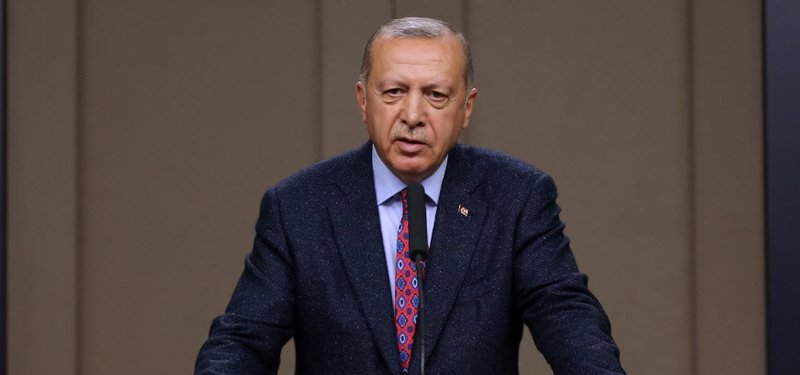
No indication from Trump of U.S. sanctions over S-400 deal: Erdoğan
Speaking to reporters in the capital Ankara before departing for the G20 summit in Japan, Turkish President Recep Tayyip Erdoğan said in Wednesday comments: "I don't know if NATO countries began to impose sanctions on each other. I did not receive this impression during meeting with U.S. President Donald Trump."
- World
- Agencies and A News
- Published Date: 08:32 | 26 June 2019
- Modified Date: 11:46 | 26 June 2019
Turkish President Recep Tayyip Erdoğan on Wednesday said ties between Ankara and Washington are based on a strategic partnership.
Addressing a news conference ahead of his departure to G20 Leaders' Summit in Osaka, Japan, Erdoğan said Turkey and the U.S are members of NATO.
Replying to a question on purchase of the Russian S-400 air defense systems, Erdoğan said: "I don't know if NATO countries began to impose sanctions on each other. I did not receive this impression during my meeting with [U.S. President Donald] Trump."
U.S. officials have urged Turkey to buy U.S. Patriot missiles, arguing the Russian system would be incompatible with NATO systems and expose the F-35s to possible Russian subterfuge.
Turkey, however, emphasized the S-400 would not be integrated into NATO systems and would not pose a threat to the alliance.
Turkey has urged formation of a commission to clarify any technical issues, but the U.S. has failed to respond to this proposal.
Touching upon Greek Cypriots' unilateral drilling in the Eastern Mediterranean, he noted everyone who lives in Cyprus Island has right to sea. "We cannot agree if you [the Greek side] say 'we will bring it under control of southern Cyprus'.
Turkey's stance is based on win-win [on Eastern Mediterranean] and that the other party should also treat Turkey with same fairness, he added.
Turkey has consistently contested the Greek Cypriot administration's unilateral drilling in the Eastern Mediterranean, saying the Turkish Cypriots who have lived on the island of Cyprus for hundreds of years also have rights to the natural resources of the area.
Two Turkish-flagged drill ships, the Fatih and the Yavuz, launched offshore drilling operations this year in an area 75 kilometers (42 nautical miles) off the island's western coast.
The area falls entirely within the Turkish continental shelf registered with the UN and under permit licenses the Turkish government in previous years granted to the Turkish Petroleum Corporation, the country's national oil company.
Turkey wants energy to serve as an incentive for a political resolution on the island and peace in the wider Mediterranean basin rather than a catalyst for further tensions.
Manbij issue
Speaking on the developments in Syria, Erdoğan said: "The U.S., did not keep its promise on Manbij. 90% of Manbij belongs to Arabs."
"There are invaders in Manbij. Turkey wants them to be withdrawn to the east of the Euphrates. And they [the U.S.] promise us that," he said referring to Manbij deal between Ankara and Washington.
The Manbij deal between Turkey and the U.S. focuses on the withdrawal of YPG/PKK terrorists from the city to stabilize the region, which is located in the northern part of Syria's Aleppo province.
Turkish authorities stressed that the administration in Manbij, of which 85-90 percent of population is Arabs, should be balanced in accordance with the demographic structure in the region.
The U.S. has supported the SDF in Syria -- a group led by the PYD/YPG, the Syrian branch of PKK terror organization. In its more than 30-year terror campaign against Turkey, the PKK -- listed as a terrorist organization by Turkey, the U.S. and the EU -- has been responsible for the deaths of nearly 40,000 people, including women and children.
Turkey has repeatedly raised security concerns after the announced troop withdrawal, saying the pullout would give room to the PYD/YPG to expand operations.
Also, Erdoğan said "we will bring the issue of Syria in bilateral meetings with Trump and [Russian President Vladimir Putin" on the sidelines of the G20 Summit.

